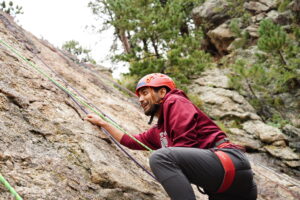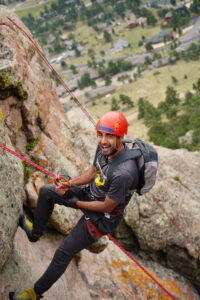Phone: 303.945.2490 Fax: 866.592.6911 Email: [email protected]
621 Kalamath St. Ste 175, Denver, CO 80204
We’re celebrating the third annual Out Living It Day on Saturday, July 26! This special day of Out Living It celebrates our belief in the ongoing healing power of adventure and connecting with community.
Celebrate Out Living It Day with us on Saturday, July 26, by joining a Community Adventure near you!
JOIN US FOR A 2025 HEALING ADVENTURE!
If Raymond “Scratch” Burns could offer a bit of advice to anyone considering joining First Descents on a life-changing program after a cancer diagnosis, it would be this: Keep an open mind about what you might get out of it.
“In so many ways, when I initially went into it, I just wanted to have fun,” he says. “I thought, ‘I’m over that whole cancer thing.’ But there were so many things that I never realized were still there and still really bothering me, and so it was really healing. I didn’t think that was going to be the case at all.”
He adds, “I’m very close to my parents and my wife, but these people could relate on just a totally different level. It was very much about the people, the culture, the community.”
When Scratch received his colon cancer diagnosis at the age of 25 in 2013, he was happily pursuing his goal of becoming a high school physics teacher. But he could no longer ignore the excruciating pain he felt in his abdomen, and after bouncing around from doctor to doctor with no explanation, he finally took himself to the ER one night.

“I was just in so much pain, I couldn’t take it anymore,” he says. The doctors decided to take an inflamed chunk of his large intestine out, and only after it was sent to the lab were they able to diagnose it as Stage 2b colon cancer. “So, yeah, I had a colostomy at that point, and I didn’t even know what that was until I woke up from the surgery and had one. Surprise!”
But that wasn’t the only shock Scratch was in for: It turns out that he had inherited one of the most common hereditary cancer syndromes. “It’s so unusual for someone to have cancer so young, and that’s why it took them so long to consider that as a diagnosis,” he shares. “My dad was adopted, and so they didn’t have his family history, and my dad felt horrible, because he didn’t get it, but he was the one who transferred it to me.”
Scratch says he considers himself lucky, though, because many people with a colon cancer diagnosis never experience pain, which means that the cancer has sometimes metastasized by the time it’s discovered. Because it was between Stage 2 and 3, he had to do chemotherapy, but afterward was able to have a colostomy reversal. But during the reversal, the doctors discovered that a small amount of cancer had spread to the small intestine. “They removed that, and I decided not to do chemo again, but now ten years later, while it may not have been the smartest idea, I’m grateful that it has worked out.”
Two years ago in 2022 – eight years after his initial diagnosis – Scratch’s wife happened upon a First Descents video by longtime FD supporter Dr. Glaucomflecken on YouTube and encouraged him to fill out an inquiry to start the process of joining a transformative adventure.
“I’m a very outdoorsy person, but I’d never been rock climbing before, and so it was scary to even consider it,” the Hackensack, N.J., resident says of his week in Estes Park, Colorado. “”But once I was there, I maybe had a few moments where I was scared, but mostly I was feeling like, ‘I can do this.’ And part of that was because the guides and the other people there were so supportive.”

His impression from that trip was that “the vast majority of people who are going on these adventures are not athletic. The vast majority are doing this for the first time, and they’re very uncomfortable going into it and probably thinking the same things as you. So don’t let that be the reason you miss out.”
He appreciated that the first day was light and eased everyone into what was to come, and the instruction each day built on what they had learned the day before. “You could work on your comfort level,” he explains. “There were people who didn’t want to do some things or couldn’t, and that was fine, but I think they got just as much out of it as anyone else. To me the physical activity was very secondary to the community.”
In fact, he says, he thought the hardest part of the whole experience was making sure he had all of his medical forms. “Once I realized that hospitals and doctor’s offices have dedicated people to get these things signed for you, though, it went by pretty quickly,” he adds. “It seems overwhelming at first, but it really isn’t.”
Since his FD experience, he’s been inspired to make some lifestyle changes, most notably his red meat intake. “I will still have it once in a while, but much more of a side dish than a main course. I would say I consume about 20% of what I used to consume.”
He hasn’t been able to go rock climbing again yet – but he’s been a bit busy: He and his wife have a 3-year-old son, and another on the way.
“I’ve definitely thought about it, because I think about that trip a lot.”
Do you offer trips for seniors 45-60?
Anything where adults gather to forget about life for a while.
We do offer Community Adventures, which are open to anyone ages 18+. This brings together members of our community on adventures led by locals who are also part of the FD family. You can see if there’s one near you here: https://firstdescents.org/community-adventures/. We hope to see you there!